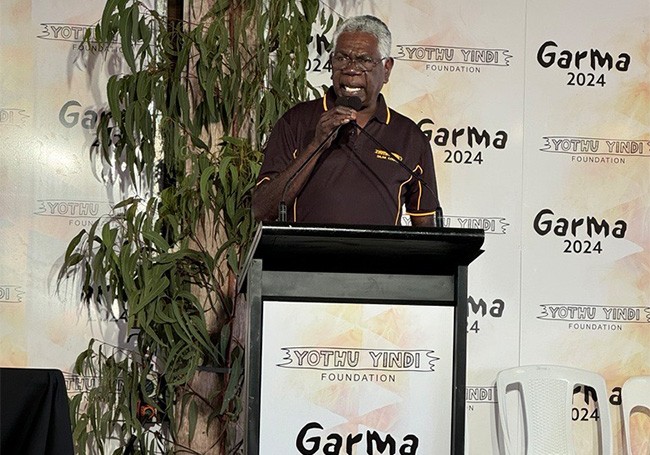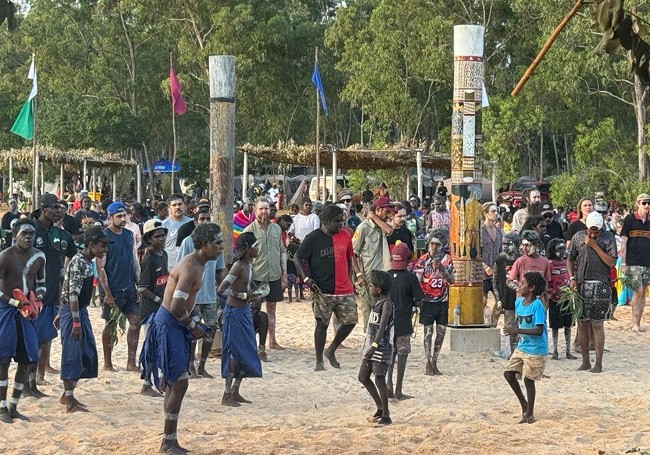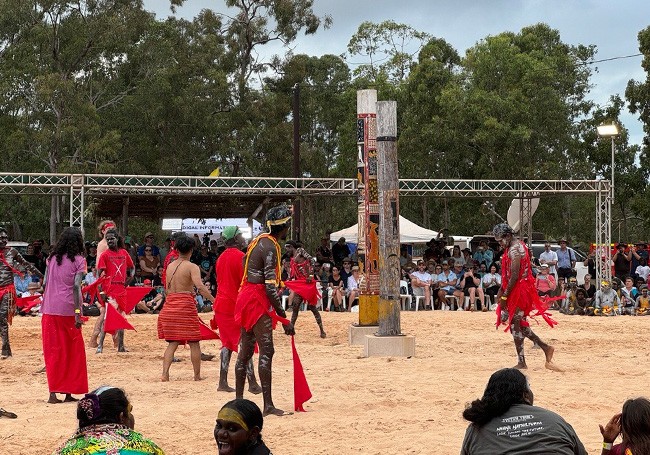First Nations readers are advised that the following article contains images of and references to deceased persons.
Nearly one year after the failed Voice vote, the 24th Garma festival was held on country again in August in remote Eastern Arnhem land. This year, the AICD again sent a delegation to the important event. The mood at Garma was sombre as various speakers described their hurt and disappointment at last year’s Australian referendum result and discussed ideas on ways to move forward with the help of new federal Minister for Indigenous Australians Senator Malarndirri McCarthy. Powerful themes were the need to improve Closing the Gap results and to empower First Nations communities at a local and state level through economic advancement, treaties, partnerships, land councils and native title systems.
Image captured in the remote North East Arnhem Land on Yolngu country. The image features large portraits of senior members, past and present, of the Dilak Council, displayed along the major walkways at Garma 2024. The Dilak Council is a 13-clan cultural authority, embodying a traditional governance model from North East Arnhem Land.
The theme for this year’s Garma Festival was Fire, Strength and Renewal. Many speakers referred to the Voice referendum as a scorching force from which they are still recovering as they consider ways to regroup for action for the future.
Denise Bowden, CEO of the Yothu Yindi Foundation, described the referendum result as “soul-crushing”.
"Our ancestors made us strong, intelligent, determined people and we have needed all of these qualities as we experienced the referendum result," she told the crowd at Garma. Each year the Closing the Gap report results were worse than the last, she added. “Do we just walk away? Or do we take up our responsibilities to make things better?”
She urged Australians not to ignore the dispossessed and disenfranchised while others profit. “Let’s strengthen ourselves for the work ahead and remember that after the fire comes the rain, then new growth, from which springs the hope and dreams of the future.”
Her sentiments were echoed by Chairman of the Yothu Yindi Foundation Djawa Yunupingu, who called for partnerships with business, government and land councils to boost economic growth and advancement, especially in remote communities such as East Arnhem Land, where the Garma festival is held. “This is the great Australian dream and we want to be a part of it,” he declared to the crowd.
Writing in the official Garma 2024 festival publication, Yunupingu admitted he was still hurting after the vote. And in his keynote address he outlined opportunities missed and pain which resulted from the failed referendum. But he and the Yolnu people are now looking ahead to the future.
"Yolnu people are not dismissed by a single event," he said. "The land is timeless and powerful. It remains and we remain and I stand here today to tell you we will renew ourselves, not tomorrow, but today."
"We sought a path to unity and we still seek it, we know that after the fire comes renewal and that goodness rises in the country after the fire has burned through the country."
New federal Minister for Indigenous Australians Senator Malarndirri McCarthy pledged to “reach out across the political divide” to address issues and dialogue in a bipartisan manner with her parliamentary colleagues.
“There are over 200 politicians in that Parliament and they can make a difference for First Nations people in this country.”
The government still remains committed to the three elements of the Uluru Statement from the Heart, she said. She later told the media this included a Makarrata commission — a formal process for agreement-making and truth-telling, despite Prime Minister Anthony Albanese putting focus on different consultation processes.
He told the ABC's Insiders program that talking to First Nations organisations - including land councils, was the best way to engage with First Nations people, as opposed to setting up a formal commission to oversee agreements and truth-telling.
“Now it’s time to reach across the political divide and ensure that Indigenous Affairs is not the political football that we have seen used so treacherously at times, so hurtfully….” said McCarthy.
“What we don’t want to see in this country is the hatred and the hurtfulness that occurred throughout the referendum. I for one will not accept that.”
Unless there is respectful dialogue with First Nations people, “nothing changes”.
Federal partnerships
At the 2024 Garma festival, the Prime Minister in his speech signalled a fresh focus on First Nations education, partnerships and economic development. He announced a First Nations Economic Partnership with the Coalition of Peaks and a boost in the investment, borrowing and lending power of Indigenous Business Australia. Plus a $20 million Arnhem Land investment to build the Garma Institute, a tertiary education centre owned and run by Yolnu people.
The economic partnership would sharpen the focus on delivery and strengthen accountability and offer support for existing First Nations agencies, he said. “A new partnership for a new direction – with greater independence, real empowerment and lasting economic security for communities.
“We know important work is being done already by the Coalition of Peaks and the First Nations Economic Empowerment Alliance.
“And I have made it clear to both my Department of the Prime Minister and Cabinet and Treasury to get right behind these efforts.”
He also said the government is developing the First Nations Clean Energy Strategy with states and territories. “We want projects generating renewable energy on country, to bring new economic power to communities.
“Some of the changes we need to make are not political, they are practical. For example, many of the more than 270 native title bodies don’t have the resources to engage in commercial negotiations.
“Equally, there are many companies that wouldn’t know where to start, who to talk to or how to make a worthwhile agreement. Too often, the result is a stalemate.”
The government would also partner with the First Nations Heritage Protection Alliance to create a central point of contact in communities to connect directly traditional owners with job creators, companies and investors.
Pathways forward
Many speakers issued pleas for recognition, self-determination and control over First Nations outcomes, especially for economic advancement.
Ian Hamm MAICD, chair of the Indigenous Land and Sea Corporation and a member of the AICD board, welcomed the shift in direction by the federal government towards economic empowerment.
“Most Aboriginal work has always been in the realm of social policy, and we've hardly touched economic policy. Well, now we are going to engage economic policy as much as we can. When you put those two things together, you might actually really get an uplift in the general wellbeing of Aboriginal Australians,” he told the AICD on the sidelines of the Garma event.
He was pleased about how the government is broadening its First Nations focus from a policy perspective. “He (the Prime Minister) spoke about bringing in Treasury, Finance, Employment and other ministers who were economic ministers to play significant roles, rather than being at the edges and basically passing it off to the Indigenous affairs minister. I think that's really big.
“That's a huge fundamental shift in how government thinks about what its role is … It's built around opportunity and capability and capacity.”
Hamm told the AICD that positive steps were being made towards treaty agreements in Australia. In Victoria, his home state, treaty negotiations will begin late this year. Victoria’s Treaty Authority has launched an official database and Victoria's First Peoples' Assembly is in the final stages of preparing its position ahead of negotiations.
“That is a huge, huge milestone that I've got to be honest, nobody really envisaged would ever happen. And yet here we are. We're on the cusp. We have a First People's Assembly. We have a Truth Commission.”
One of the positive benefits of federation is that states can do their own thing in their own jurisdictions, he told AICD. “They're not welded to the outcome of something the Commonwealth does.”
Hamm told the festival crowd it was important for Australian companies to realise that they should not just deal with First Nations entities because they have a RAP plan, but because it is “good business”.
He said there were only four Aboriginal directors on Australian ASX 200 boards, or about 0.4 per cent of these directors, which was insufficient. He added that the AICD was performing important work in this area to increase the number of First Nations directors on boards.
Australians need to take up the challenge of the lack of access to capital that many First Nations businesses face, he added. “This is a handbrake on growth in the Aboriginal business sector.” This lack of financial power then has a multiplier effect through the whole First Nations sector. He made the comments during a panel session on First Nations Economy, Agency and Initiative, which can be viewed here.
Professor Peter Yu, vice-president, First Nations, Australian National University, said there were about 15,000 First Nations businesses in Australia, which were growing. “It is happening but very slowly.”
He welcomed the Prime Minister’s commitment to shift the policy framework so that First Nations policies can be developed in a comprehensive way with more community-controlled decisionmaking through First Nations agencies working directly with Treasury and Finance. Housing and infrastructure should be priority areas. He added that methods need to be devised the lower the entry hurdles for Aboriginal entities to do business.
Native Title review
Dr Josie Douglas, General Manager, Central Land Council, said that 3,300 community controlled Aboriginal entities exist in Australia, which are “a precious and unique sector” whose members are drawn from community.
She added that a review of Native Title by the Australian Law Reform Council (ALRC) is under way which could widen the scope of national native title holders.
The federal government asked the ALRC to undertake the review and provided funding of $550,000 to enable the ALRC to engage closely with regional, remote and very remote stakeholders. The funding forms part of the government’s $20.8 million 2024-25 Budget measure to improve the native title system. Native title is recognised over nearly half of Australia’s landmass.
Director Perspectives
Marina Go AM MAICD is a director on the boards of Transurban, Energy Australia, Adore Beauty and AICD, and Advisory Board Member of the National Foundation for Australia-China Relations.
It’s my first time at Garma and I've enjoyed being here. I feel privileged to be in a position where I can listen to some incredible thinking from various First Nations speakers from around the country. I guess one of my thoughts was that the Voice was about listening.
They're asking to be heard and I feel that by attending, we are hearing them. It doesn't solve the hurt of last year and that pain is palpable. I felt it and various people that I spoke to, First Nations people, talked about the hurt of rejection that will never heal.
But what they're doing now is taking matters into their own hands, which feels right. That was a real theme here, with speakers saying, yes, we would love Australia to have been with us, but Australians don’t get it. So we're just going to get on with it.
They're taking their economic prosperity into their own hands. That's a big statement. First Nations speakers said what we need to do is create wealth for our people, and we need to put ourselves in a position where Australians will listen to us because we are powerful. We're not at the moment, so it's easy for people not to listen to us.
I know the Prime Minister’s statement wasn't everything the community wanted to hear. Maybe it didn't go quite as far as they hoped, particularly regarding the Makarrata commission. He didn't mention the word ‘commission’. The Prime Minister instead talked about investing $20 million into the Garma Institute. It will ideally provide a significant boost for an organisation that can educate and train people into real jobs and enable communities to get themselves into a better financial position, which is what we were hearing the First Nations speakers say was needed. I thought that sounded like a green shoot for the local community.
In terms of boards, my sense is that a lot of boards, particularly at large organisations, are getting on with it and listening to their communities through various means. But if you haven't had the opportunity to get out into the regions and listen to the great work that First Nations peoples are doing in their communities, then you are missing out.
So I would encourage directors on all boards, but particularly those who operate on country to get out there and take a look and listen, and not just leave it to the executives.
I am a director of EnergyAustralia and when we visit our sites there's often an opportunity to engage with the community and local groups.
One of the real challenges for energy operators is you have to be able to effectively manage water because you need water to operate the plants and produce fuel. There was a session at Garma on how Traditional Land Custodians manage their water and land, and some of it may well unlock some answers.
I think it's always a good idea to keep an open mind and very often the past can inform the future. There's a lot of wisdom sitting with cultures like these and we would do well to listen to them.
Melinda Cilento GAICD is Chief Executive, Committee for Economic Development Australia (CEDA), Reconciliation Australia Co-Chair, and sits on the board of Australian Unity
I have had the great opportunity to once again attend the Garma festival in East Arnhem Land. Although I was unsure what the mood would be this year, in the aftermath of the Voice referendum. But I should not have been. What was felt, heard and observed once again was the strength, respect, generosity and optimism of the Yolngu people.
Chairman of the Yothu Yindi Foundation Djawa Yunupingu in his keynote address spoke of the pain and opportunities lost from the failed referendum, but also looked to the future, noting “we sought a pathway to unity and we still seek it”.
Prime Minister Anthony Albanese also spoke about the referendum outcome and underscored a renewed focus on First Nations education, partnerships and economic development. His speech focused on optimism and aspiration, but like many others during the festival, also emphasised the many challenges faced by First Nations peoples and communities that remain dire and unacceptable.
The apology from NT Police Commissioner Michael Murphy to First Nations Territorians for “the past harms and the injustices caused by members of the Northern Territory Police” over the last 154 years serves as a stark reminder of the discrimination and racism that persist. If we are to close the gaps, as we must, nothing short of systemic change is required.
Ian Hamm MAICD is chair of the Indigenous Land and Sea Corporation, First Nations Foundation and Koori Heritage Trust. He also sits on the board of the Australian Institute of Company Directors (AICD).
Boards and directors have to work way more broadly now. We have to accept our responsibilities, which may be far beyond what we may have thought previously. The world has shifted dramatically and particularly in the Australian context, you are being judged now on what are you doing to contribute to a better society in Australia.
So we need to consider…what is the contribution we make as an organisation? What is it I am contributing as a director? Am I sufficiently across the much greater breadth of things that I will be judged on? How much of that contributes to a better community?
In terms of First Nations economic opportunity and participation, moving forward we have to think about what this means. Is our RAP plan just about procurement? Or does it go to a much bigger set of outcomes? How embedded are First Nations people in our organisation?
We have to look at and understand what First Nations people bring to us as an organisation. It is a complete 180-degree turnaround in how people think. But significantly, if organisations embrace this, they will be better organisations.

Yothu Yindi Foundation chair Djawa Yunupingu, speaking at the Garma festival. Image captured at Gulkala on Gumatj land.


Locals and attendees participating in ceremonial dancing at the Garma festival. Image captured at Gulkala on Gumatj land.
Latest news
Already a member?
Login to view this content


